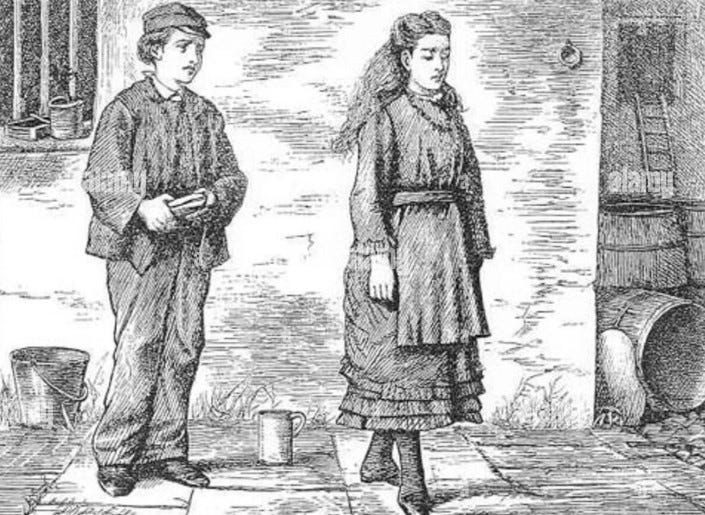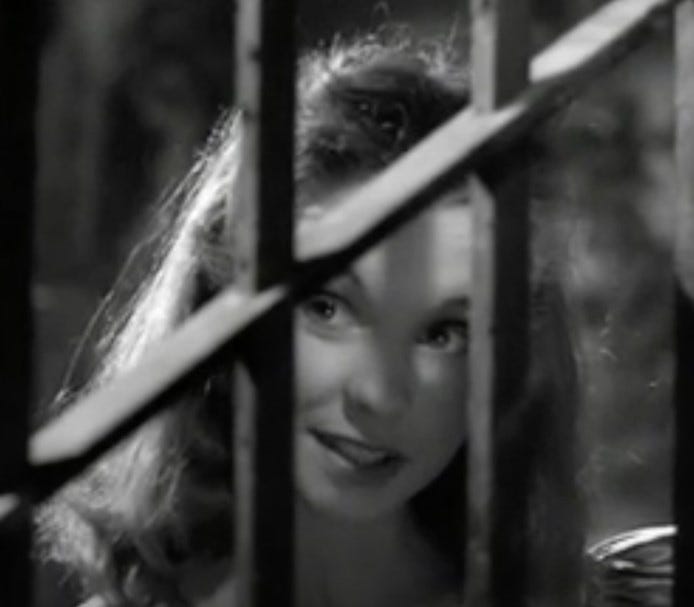“Suffering has been stronger than all other teaching, and has taught me to understand what your heart used to be. I have been bent and broken, but—I hope—into a better shape.”
So says Pip to Estella in Dickens’ Great Expectations (1861). The heavy words illustrate the weight of rejection and unrequited attraction. The girl’s No can bend you, even break you, but that can also be an opportunity to grow into a better shape, as Pip does.
Admittedly, for Pip his unrequited love for cold Estella entails a painful minefield of manipulation. But with a warm, kind girl the experience need not be so harrowing, despite the disappointment. At its best, a rejection can teach you something valuable about the woman, help you appreciate her beauty and goodness in a deeper, more gracious way – culminating in a lasting gift that will uplift you both.
Against common knowledge
Men are often advised not to approach women we are going to meet again. Co-workers, for example, are off limits. “Things will get awkward.” Rejection is easier to handle if the encounter is only a fleeting moment that shan’t repeat, or occurs in an environment where the girl will be easy to avoid, or where interaction is optional. Dating apps are the culmination of this mode of thinking. The screen keeps you secure and separate.
Rejection hurts, as it is natural to wish that the woman who you admire would also admire you – to hope that she would see in you the good that you see in her. Similarly worthy, attractive and recognized. The hope is to gain an affirming Yes, instead of a shattering No. It is understandable to try to avoid the pain caused by rejection and to use various tricks of attitude and methodology to mitigate it.
Such self-protective attitude is represented in the advice to increase the numbers, and to at all costs avoid the so called “oneitis”, i.e. regarding some particular woman as the special target of your affection. The advice has a grain of truth in that you can’t know who really is the one until you find her, and assuming things too early can lead to foolish decisions and needless wounds.
But on the other hand, all meaningful connections require a degree of seriousness and genuine interest. By serializing women, whether it be by routine bar-hunts or by the process of swiping on apps, you strip away the emotional stakes. This may feel safe or liberating, but it also removes the sense and depth from the whole process. You are no longer sparked by the special quality of an individual woman. You are no longer admiring her in particular.
Instead you now have “a type” or “an opportunity”, or begin to tell yourself that “all women are the same”. This may help with emotional strain and keep things light in face of the rejections, but it will also remove any chance of authenticity which could have made the rejections mean something. You will learn nothing deep about the woman nor about yourself as long as you keep her just as “an option among others”, or as just one representing a type. Pain will likely be lessened or even removed, but your shape will also remain unchanged.
The thing is, whether things get awkward after a heartfelt approach largely depends on how you react to rejection as a man. If you get sulky, if you grow bitter, then certainly things will get messy. But what if you don’t do that? What if you remain just as open and kind as you were before the rejection? What if you keep on appreciating her qualities just as you did before you knew she was forever beyond your reach?
Then rejection can build something valuable. It can function as a crucible which proves that the value, charm, and beauty of a woman are an independent force in the world, not something that depends on you, or on her feelings towards you. Do not underestimate how powerful it is when you keep appreciating her although both you and the girl know that you shall never benefit from the appreciation.
To her it represents deep validation and encouragement. To you it’s proof of the objective value of feminine goodness and beauty. Rejection can prove to a man that the girl’s charm was not just a worm in some instinctual hook, as the appreciation remains despite the door closing.
It also proves to the woman that the man’s interest and admiration were never conditional. He wasn’t being friendly just to hook you in, which is proved by him being just as good and friendly despite you closing the door. He admires you because you are admirable, not because he stands to gain something.
To top it off, the man will give the woman a sense of relief, because rejecting kind men isn’t a pleasant experience to a kind woman. Noticing you are not at all sulky or angry or bitter will take away any possible anxiety she may have had, replacing it with a good reason to smile brightly. That smile shall be your reward as man who took a chance and dealt nobly with the blow.
Most significantly, you both have now gained access to a shared secret of unconditional admiration. Even if you never openly talk about the rejection and the appreciation, the experience will keep on having a silent, uplifting effect on you both. It has become a small bridge of authenticity built between two souls. She knows she has been truly seen and appreciated, no strings attached. And you know that she knows. This kind of knowledge is all too rare in this world, and such invisible bridges are well worth building – even at the cost of disappointment.
Mind you, all of this is only possible when the encounter is not fleeting, and the girl is someone you will keep on meeting and interacting with. Only thus can the grace of rejection be realized and the bridge built. Only thus can you prove to yourself that her beauty and goodness have remained as they always were. Only thus can she see that you have not changed, and your appreciation and kindness haven’t disappeared despite the No.
Fundamentally this means that rejection, if truly and gracefully accepted, can free you both from the trap of transactionality. In its small and silent way it can prove to you both that human connections are not dependent on gain or benefit.
The alternative is the attitude of conditional admiration, where the No transforms a beautiful woman into an ugly one, a kind one into a nasty one. This may help a man escape frustration, but in doing so he will also escape truth, and make the world less beautiful by blinding himself to beauty merely because it cannot be his.
Unrequited love and unconditional appreciation have a unique advantage. As if stored in amber, they can no longer be marred by the complexities of life. The secret bridge has a simple perfection to it. Realizing that she remains just as charming despite you standing on the losing side, outside the locked gate, comes with a bittersweet purity.
“I loved her against reason, against promise, against peace, against hope, against happiness, against all discouragement that could be.”
The proof of hope
Another piece of advice we are offered is that a man must be smooth and confident when he asks a girl out. The advise is sensible in that a smooth and confident delivery has an obvious aesthetic appeal to it, and can make a woman feel safe. Of course if a man is in complete shambles he may begin to inspire pity more than anything else.
But we easily forget that nerves are the most unmistakable sign of authenticity, living proof that she means something to you. The evidence given by the anxious look in your eyes, the unpolished quality of your words, or the tremor in your voice is so powerful that no fancy eloquence could match it.
If you really care about the girl and about her answer, why avoid showing it to her? Sure, detachment can help guarding your heart or protect the way you present yourself to the world. But is guarding your heart so keenly a wise thing to do if you are trying to find someone to love?
The whole point of asking a girl out is to reveal your heart to her. That’s what makes it challenging: accepting the vulnerable position of the one being judged. Though understandable given the emotional strain of the situation, it is ultimately counter-productive to hide yourself behind a sturdy wall of confidence and well practiced delivery. Ironically, by trying to game here you only make yourself invisible.
What’s more, genuine nerves can make a seemingly innocuous or non-committed question like “Would you like to go and have a cup of coffee with me?” gain a powerful and obvious subtext. Because of the expression on your face and the nervousness in your voice, the girl now knows you’re not interested in her as just a friend or as someone to chat with. You’re interested in her as a woman. Again, this is something you’ve now shown her in a genuine way even a skilled actor would find difficult to fabricate.
When the moment comes, it is always easy to find good and rational reasons not to ask. She’s probably not a good match anyway. She’ll probably say no. She probably already has a boyfriend. She’s probably out of my league. It’s not prudent to ask at work, nor at class. This is not a good moment. Etc. These may even be true observations. But lack of daring need not be based on lies. All the trenches and foxholes have men in them who scoff at the foolishness of others who rush out to storm an enemy position. The guy who remains dug in can keep on repeating to himself how he’s the smart one. The prudent one. But such prudence is just a mask covering the face of a coward.
More than anything else, the one fact the act of asking irrefutably proves is that you are still capable of hope. No matter how many times you’ve received the No, you have not blinded yourself to the value and charm of womanhood. Your heart has not hardened, and hope still lives inside it, spurring you up the hill. In the end, the surest way to strengthen hope is to keep committing hopeful acts.
Slowly refashioning your shape this way destroys the zero sum game. Even when another rejection comes, you are not left off holding an empty sack. Merely by asking you have verified that hope lingers, which by itself will lift you up in life. Then comes the opportunity for building a secret bridge from the bricks and planks only a heart opened in hope can bestow.






